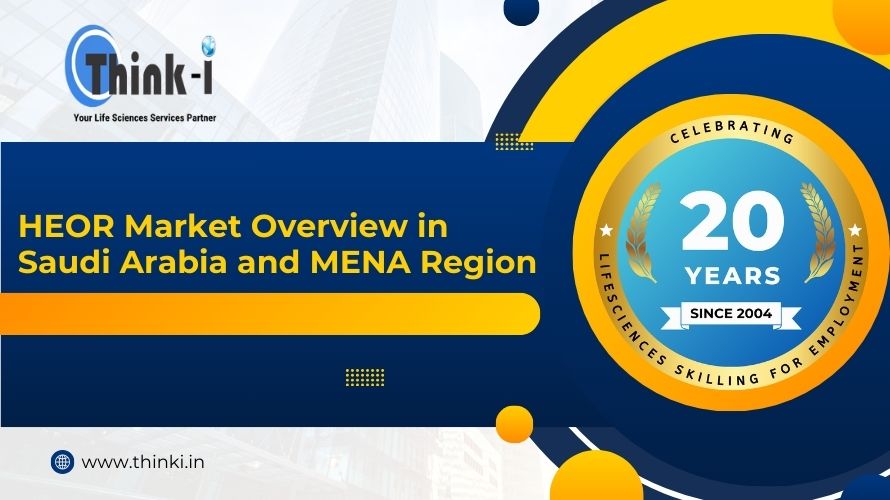
The Health Economics and Outcomes Research (HEOR) market is experiencing significant growth across Saudi Arabia and the broader MENA region. Key factors driving this expansion include progressive government policies, healthcare reforms, and a surge in investments in research and development (R&D). The healthcare landscape in these regions is shifting toward value-based care, where outcomes, cost-effectiveness, and patient benefit are prioritized. This transformation is creating a robust environment for HEOR to influence health policies and practices profoundly.
In Saudi Arabia, HEOR is becoming an integral part of healthcare reforms under the Vision 2030 initiative, which aims to diversify the economy away from oil dependency and modernize various sectors, including healthcare. The Saudi Food and Drug Authority (SFDA) and the Ministry of Health are adopting HEOR methodologies to evaluate the cost-effectiveness of new treatments, ensuring sustainable healthcare financing. These approaches are crucial in determining drug pricing, reimbursement strategies, and assessing the long-term benefits of new technologies in the healthcare market.
Similarly, other MENA countries like the United Arab Emirates (UAE), Qatar, Egypt, and Jordan are implementing HEOR in broader healthcare reforms. These nations are focused on modernizing healthcare systems, with HEOR playing a pivotal role in determining patient access to treatments and developing value-based reimbursement models. In particular, the UAE is leveraging HEOR to drive decisions on resource allocation and healthcare investment to optimize outcomes.
The rapid adoption of HEOR methodologies across Saudi Arabia and other MENA nations is generating numerous job opportunities. Pharmaceutical companies, biotech firms, healthcare payers, consultancies, and contract research organizations (CROs) are seeking skilled HEOR professionals to provide critical services such as market access consulting, economic modeling, and real-world data analytics. Key players in the HEOR market include global companies such as IQVIA, ICON plc, Syneos Health, PPD Inc., and McKesson Corporation.
In Saudi Arabia, the Ministry of Human Resources and Social Development, in alignment with Vision 2030, is fostering job creation through workforce development programs. The country has ranked high in labor market effectiveness and skilled foreign labor, further reflecting the government's commitment to creating favorable employment conditions. Despite this, a shortage of skilled HEOR professionals remains a challenge, underscoring the need for increased investment in specialized training programs.
Several multinational and regional organizations are driving the implementation of HEOR across the MENA region. Leading companies in the sector, such as IQVIA, Syneos Health, ICON plc, PharmaLex, RTI Health Solutions, and Avalon Health Economics, are offering services like market access consulting, real-world evidence analysis, and economic modeling. These companies are working closely with government bodies like the Saudi Ministry of Health and public healthcare systems in the UAE, Qatar, and Egypt, helping them leverage HEOR to improve patient outcomes and optimize resource allocation.
Local organizations in Saudi Arabia, particularly government health institutions, are also actively utilizing HEOR frameworks to enhance decision-making processes. HEOR is particularly valuable in evaluating the cost-effectiveness of new treatments, helping governments decide which drugs and technologies should be integrated into national healthcare systems.
HEOR is making a profound impact on healthcare systems across the MENA region, especially in areas such as cost containment, healthcare access, and patient outcomes. In Saudi Arabia, HEOR is being used to determine the value of medical treatments, which allows the government to make informed decisions about including new therapies in the national healthcare system. This process improves patient access to essential medications and innovations.
The transition from fee-for-service to value-based reimbursement models in the region has also been supported by HEOR studies. Governments and healthcare organizations are increasingly relying on HEOR to evaluate the long-term impact of healthcare interventions and optimize spending.
The global HEOR services market was valued at approximately USD 1 billion in 2022 and is projected to grow to USD 3.69 billion by 2032, with a compound annual growth rate (CAGR) of 14.3% during the forecast period. This growth is driven by the increasing reliance on HEOR studies to support the launch of new drugs and treatments.
HEOR is also driving substantial improvements in drug pricing strategies, ensuring that new therapies are cost-effective while expanding patient access to cutting-edge treatments. The MENA region is becoming increasingly reliant on HEOR to streamline healthcare decision-making, optimize resource allocation, and enhance patient care.
The HEOR market in Saudi Arabia and the MENA region is on a strong growth trajectory, driven by government policies, healthcare reforms, and private sector participation. HEOR’s influence on healthcare decision-making is increasing, particularly in areas related to cost-effectiveness and improving patient outcomes. However, challenges such as the shortage of skilled professionals remain. Addressing this gap through specialized training programs will be essential for maintaining the momentum of HEOR growth in the region. Continued investment in R&D and the integration of HEOR into healthcare systems will further enhance the sustainability and efficiency of healthcare across Saudi Arabia and the MENA region.